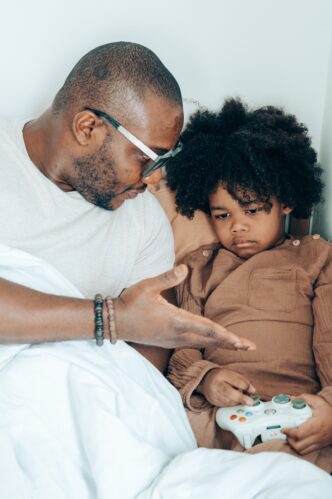In parenthood, communication stands out as one of the most vital threads, weaving together the bonds between parents and their children. Amid the many challenges parents face in nurturing and guiding their offspring, the manner in which they communicate holds great significance. However, a disconcerting pattern persists and that is the prevalent use of yelling as a disciplinary tool.
The resounding echoes of raised voices reverberate not only through the walls of the homes but also through the very cores of the child’s beings.
In this article, The Love Central explores the implications of this age-old practice as it has become imperative to shed light on what yelling truly does to children.
The immediate effects of yelling on children
Growing up in an African home, the chances of being yelled out or even worse – getting a beating – were almost 100%. It is almost as though all parents were in some sort of Whatsapp group where they shared tips on how to raise their kids.
Sadly, while the immediate aftermath of a yelling episode may seem like a fleeting event, its repercussions can linger within a child’s psyche for far longer than we might anticipate.
- When a parent raises their voice in anger, it sends a clear message to the child that their actions or behaviour are inadequate or unacceptable. This can chip away at the child’s self-esteem.
- Yelling can also lead to increased anxiety in the child. The home environment, which should ideally be a sanctuary of comfort and security, can transform into a source of apprehension and unease, leaving children in a perpetual state of heightened alertness.
- Yelling introduces an element of fear into the parent-child relationship. Children may come to associate their parents with fear, expecting sudden outbursts even for minor transgressions.
- Parents serve as primary role models for children, shaping their understanding of how emotions should be expressed and managed. When children witness their parents resorting to yelling as a primary means of communication, they internalize this behaviour as acceptable. This is why a lot of African parents defend yelling as an effective method of parenting.

Alternatives to yelling at children
If your aim is to foster a healthy parent-child relationship, a shift from punitive measures toward constructive communication is very important.
Parents can create an environment where children feel heard, valued, and empowered by kicking out yelling as a disciplinary option and opting for healthier options.
Below are some alternatives to apply:
- Active listening: When parents actively listen to their children’s thoughts, concerns, and feelings, it sends a powerful message of validation, encouraging children to express themselves without judgment and fostering trust.
- The Gift of Positive Reinforcement: Acknowledging and celebrating positive behaviour can work wonders in building a child’s self-esteem. Offering praise and rewards for accomplishments, no matter how small encourages children to continue exhibiting desirable behaviour.
- Empathy as a Bridge: Cultivating empathy within parent-child interactions bridges the generational gap and deepens understanding. When parents acknowledge their child’s emotions and show empathy, children feel understood and supported.
- Clear Expectations and Consequences: Establishing clear expectations helps children understand the boundaries and guidelines within which they can navigate.
Parents should seek support and professional help
There are many people moving around with deep-rooted issues that they refuse to acknowledge. If you as a parent struggle with using healthier methods to discipline your children then there might be an issue – with you.
Recognizing the challenges of managing anger and its potential impact on parent-child relationships is a pivotal step toward fostering a healthier family dynamic.
For parents who find themselves grappling with anger management, seeking assistance and engaging in family therapy can be transformative. Acknowledge that you need help and seek the help of a therapist.
Conclusion on effects of yelling on children
In parenting, the tone of communication carries a profound influence that shapes the lives of children. Yelling casts shadows of fear, anxiety, and strained relationships.
By embracing alternative approaches rooted in understanding, empathy, and professional support, parents can transform this discord into a nurturing environment where children thrive emotionally, mentally, and socially.
Parenthood Unpacked: Stop Judging People Who Don’t Want Kids
In African society, the natural order of things for young people, once they are done with school and manage to secure a stable job, is to get married and have children.
Throughout history, this societal belief has firmly established the idea that marriage should be succeeded by the bearing of children.
In this article, we talk about why people should not be judged for choosing a child-free life.














